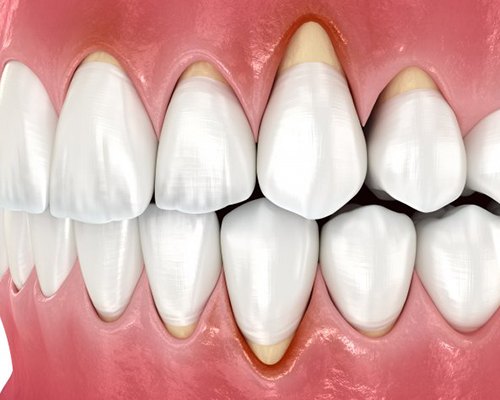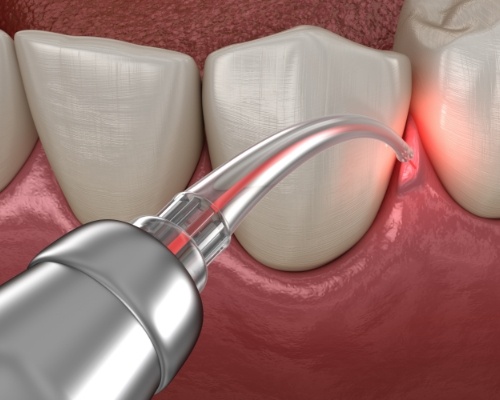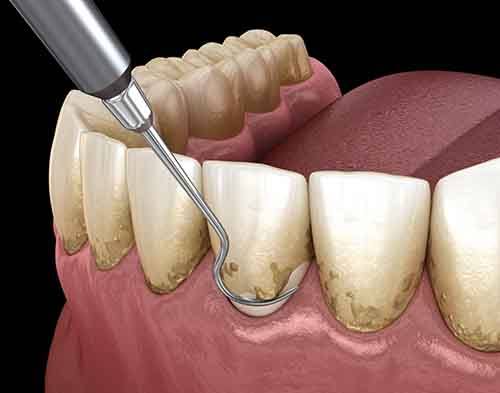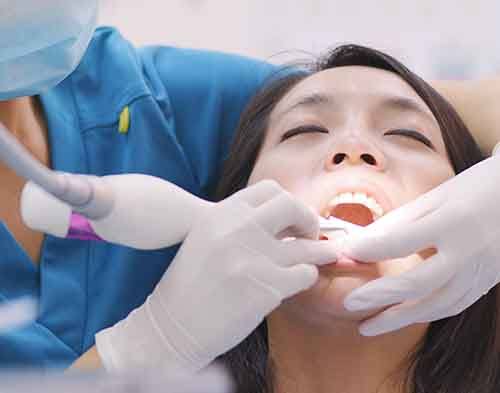Gum Disease Treatment – Jenks, OK
Saving Your Gums to Better Protect Your Teeth

When bacteria attack the soft oral tissues of your mouth, your teeth become a target. Without proper intervention, gum disease can lead to tooth loss and problems associated with your overall health (i.e., diabetes, heart disease, or negative cognitive decline). At Elwood Avenue Dental, we want to help you avoid that with gum disease treatment in Jenks. To save your gums and protect your teeth, we use innovative dental techniques to give your smile a second chance. Call us today to find out more about this effective way to restore your oral health.
Why Choose Elwood Avenue Dental for Gum Disease Treatment?
- Laser Gum Disease Treatment for More Comfortable Care
- State-of-the-Art Dental Facility with Several Amenities
- Sedation Dentistry Available
Symptoms of Gum Disease

The first stage of gum disease is gingivitis, or inflammation of the gums that involves symptoms like:
- Bad breath (halitosis)
- Dusky or angry redness
- Swelling
- Bleeding when you brush or floss
- Tenderness
- Gum recession
If gingivitis is allowed to progress, it will eventually become a much more serious issue called periodontitis that causes permanent damage. Signs of this advanced infection include:
- Pain when chewing
- Loose permanent teeth
- Dental sensitivity resulting from gum recession
- A change in your dental alignment
- Changes in the way dental restorations like dentures and bridges fit
- Tooth loss
How Do We Treat Gum Disease?

Before determining the best gum disease treatment for you, our dentist will carefully inspect your mouth to determine the severity of the problem and the most suitable way to address it. Dr. Salayta or Pracht may recommend:
Laser Periodontal Therapy

To more accurately target pockets of harmful oral bacteria that are hard to reach, we can use our Gemini dual-wavelength diode laser. This allows us to eliminate harmful plaque and tartar that serve as breeding grounds for the destructive germs that harm your gum tissue. The precision of the laser also serves to benefit your smile because it focuses solely on the problem areas while leaving healthy tissue alone.
Scaling & Root Planing

For patients who have advanced gum disease known as periodontitis, a deeper cleaning of the teeth and gums may be necessary. This is known as scaling and root planing. This two-part process first removes dangerous oral bacteria from below the gumline and then smooths the roots so that your healthy gum tissue can successfully reattach to your teeth.
Do I Need Scaling & Root Planing?

If you are experiencing signs of advanced gum disease such as gums that bleed when brushed or flossed, gum recession, chronic bad breath, swollen or puffy gums, or visible plaque buildup, you may need a scaling and root planing treatment to protect your smile.
While the early stages of gum disease can often be remedied by increasing your at-home oral hygiene, if the condition has progressed, scaling and root planing may be necessary to prevent it from worsening.
The Process of Scaling & Root Planing

Typically, the scaling and root planing process takes place over the course of two appointments:
- First – Using a tool called a scaler, your dentist will clear away all the plaque and tartar from the surface of your teeth, as far down as the pockets of your gums.
- Second- At your return appointment, your dentist will remove any hardened bacterial deposits on the roots of your teeth that are hidden below your gumline. This will help prevent further infection by keeping the bacteria from recolonizing in your gums.
Aftercare Tips for Scaling & Root Planing

Scaling and root planing can sometimes be an intensive treatment, which is why you may need several weeks for your teeth and gums to recover. During this time, you may experience increased sensitivity and discomfort as a natural part of the healing process.
Some general aftercare tips for scaling and root planing include:
- Be sure to rinse your gums with warm saltwater after eating. This will help prevent irritation and loosen food debris around the teeth, making brushing and flossing easier. To make the saltwater, simply mix ¼ teaspoon of salt for each eight ounces of water.
- Brush gently after treatment, and don’t use a hard-bristled toothbrush, only soft-bristled. Instead of brushing in a back-and-forth motion, use slow, circular motions.
- Your teeth and gums may be sensitive to certain foods and beverages after treatment; avoid anything hot or spicy, as well as alcoholic or acidic beverages, as these can cause inflammation. Also, avoid tobacco or smoking.
- Eat a soft diet for the first 48 hours following your treatment.
- Avoid intensive physical activity immediately after your procedure, as this can prolong your healing process.
Gum Disease Treatment FAQs
How Do I Know if I Have Gum Disease?
Gum disease is surprisingly common, affecting nearly half of the American population, yet many people don’t realize they may already be showing signs of it. Some of the earliest indicators include gums that are swollen, tender, irritated, or appear darker than usual. You might also notice discomfort or bleeding while brushing or flossing. These symptoms often signal inflammation or an infection in your gum tissue, which can worsen over time if left untreated. That’s why it’s important to call our dental office as soon as you notice any of these issues. With early care, we can stop the progression of gum disease and protect your overall oral health.
What Are the Health Risks of Gum Disease?
When detected in its early stages, gum disease can be successfully treated and even fully reversed. However, if the condition is left unchecked for too long, the infection can lead to lasting damage—such as receding gums, weakening of the jawbone, and eventual tooth loss. Unfortunately, the consequences can extend far beyond your mouth. Advanced gum disease has been associated with a heightened risk of serious health conditions, including heart disease, stroke, diabetes, certain types of cancer, Alzheimer’s, and other systemic illnesses. The harmful bacteria responsible for gum inflammation can enter your bloodstream and trigger inflammation in your arteries, increasing the chances of these major health complications.
Is Gum Disease Considered an Emergency?
Although gum disease may not be as urgent as a sudden dental emergency like a knocked-out tooth, it should still be taken very seriously. It’s important to contact our dental office promptly if you notice any warning signs of gum disease. We’ll make sure to schedule your visit for care as soon as possible. Unlike some health concerns that may improve on their own, gum infections tend to progress over time, potentially causing severe complications if ignored. Early intervention is key to protecting both your oral and overall health.
How Can I Prevent Gum Disease?
Fortunately, gum disease is entirely avoidable with the right care habits. Remember to brush your teeth twice a day for two full minutes, making sure to gently clean along the gumline, which is a common spot where bacteria and plaque can build up. Also, floss daily to eliminate trapped particles between your teeth and along the edges of your gums. For an added layer of protection, consider using an alcohol-free mouthwash to reach spots your toothbrush and floss might miss. Most importantly, keep up with routine dental visits and professional cleanings so we can support your oral health and keep your smile strong.
If you have any other questions, feel free to reach out to our team—we’re always here to help!

